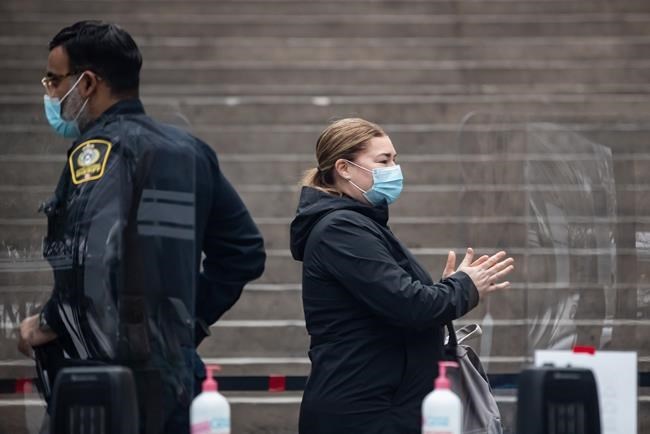VANCOUVER — Lawyers for Huawei executive Meng Wanzhou are planning to introduce a new legal argument alleging she was subjected to an abuse of process and should be freed.
Meng's legal team has already outlined three branches of arguments to support its abuse of process claim, and the fourth claim would see new court dates added in her extradition proceeding.
They allege that she was used as a bargaining chip for political purposes by U.S. President Donald Trump, that her questioning and arrest by Canadian officials were unlawful and that the U.S. misled Canadian officials in describing the case.
The B.C. Supreme Court heard Thursday that lawyers plan to file the fourth branch of argument Monday, but details of the argument were not shared.
"It may spawn additional litigation," Crown lawyer John Gibb-Carsley said.
The extradition case is ongoing amid media reports that the U.S. Department of Justice is discussing a deal that would see Meng admit to some wrongdoing and in exchange be allowed to leave Canada.
Meng was arrested at Vancouver's airport on Dec. 1, 2018, at the behest of U.S. law enforcement who wants her to face fraud charges. She denies the allegations that she misled HSBC in a presentation, putting the bank at risk of violating U.S. sanctions against Iran.
The arrest in China of Canadians Michael Kovrig and Michael Spavor, who passed the two-year anniversary of their detention Thursday, has widely been seen as retaliation for Meng's detention.
Nicole Goodman, who was chief of passenger operations for the Canada Border Services Agency at Vancouver's airport at the time of Meng's arrest, resumed testimony Thursday in an evidentiary hearing in the case.
She has told the court that the agency's then-Pacific regional director general advised her not to make additional records about the case in the weeks following Meng's arrest. Goodman wanted to create a case summary and timeline but Roslyn MacVicar, now retired, told her the notes could be subject to an access to information request, Goodman said.
She has also told the court that a border officer told her in the days after the arrest that he might have shared passcodes to Meng's cellphones with RCMP by mistake.
Goodman said she brought the passcodes issue to the attention of her direct supervisor soon after but didn't get the go-ahead to contact RCMP until weeks later, in January.
Under cross-examination by Meng's lawyer Mona Duckett, Goodman said she did not launch an investigation into how the breach happened or discipline the officer beyond speaking with him privately.
"He did not knowingly on purpose provide it in my view. I counselled him and told him this is a breach and that's serious," Goodman said.
Duckett questioned Goodman's memory of the timeline of events. She suggested Goodman wouldn't have let the passcodes sit with RCMP for weeks, allowing a risk that they might improperly access the devices or share the passcodes with U.S. officials.
The court has heard that Goodman is a stickler for privacy and strictly observes information sharing laws.
"You, conscientious as you are about information sharing I suggest, would not just let it lie for an entire month with a huge risk of use or further disclosure," Duckett said.
"I do agree, however, I just remember there was a lag time," Goodman said.
She emphasized that she knew contacting RCMP "was the right thing to do."
Duckett suggested she only confirmed the passcodes were with RCMP in January, the day after a video meeting with not only MacVicar, but other higher ups, including vice-president of operations Jacques Cloutier and his chief of staff in Ottawa.
It was the same meeting, Duckett suggested, where Goodman was advised not to take notes.
Someone at the meeting recorded a note that said, "gather but don't create," Duckett said.
If Goodman had not been given such a direction before she knew the passcodes were gone, she would have recorded a note about it, Duckett suggested.
"That's probably the only thing that does weigh on me," Goodman said.
"It didn't change or encumber anything that I did. But I, in contacting the RCMP, that's something that I probably would have emailed and said, 'this is what I've done.' "
This report by The Canadian Press was first published Dec. 10, 2020.
Amy Smart, The Canadian Press



